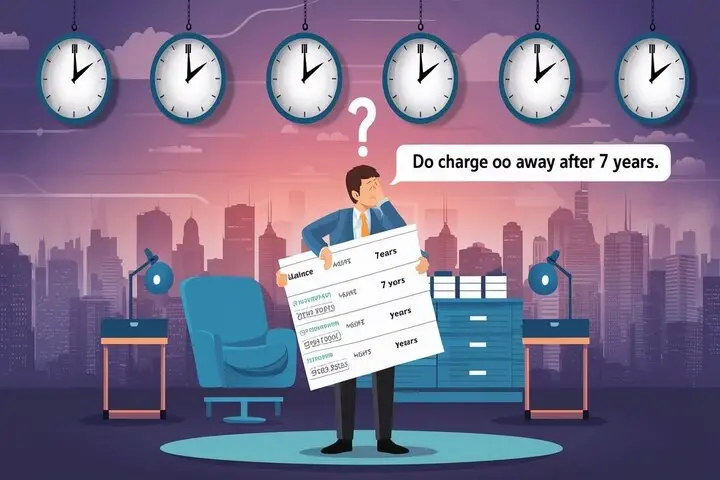
A charge-off is when a creditor has a customer who is much in arrears and the creditor declares that account as lost while in fact, the money is still legally owed by the customer. The effects of charge-offs can be detrimental to your credit score and the records can take up to 7 years on your credit history. However, charge-offs do not remain constant but transform with time on how they affect an individual. Here is everything that you need to learn about how long charge-offs remain in your credit reports and what occurs after seven years.
How Many Years Will Charge Offs Stay on Report?
Charge-offs can remain on your credit report for up to 180 days after the date your account first fell behind in its payments and became delinquent in addition to seven years. Even though you ceased making the payments on the account long before the account was charged off, the impact of the charge-off may linger longer than you expected.
Here are some key dates when it comes to how long negative information remains on your credit reports:
• Date of First Delinquency: This is the first time you have failed to make payment on the account that you have taken time to open. The days and years count as seven plus one hundred and eighty days starting from here.
• Date Reported as a Charge Off: This is when the log is altered by the creditor to indicate that it will not be paid back at all. It could even be after a year or more since the first instance of payment default.
• Date of Last Activity: It includes the date which was on the last payment or any other activity done on the account. Charge-offs remain for seven years plus 180 days from the last activity date of the specific account.
That is the reason why charge-offs remain on your credit report for 7 years from the time it becomes delinquent, and not from the time it appears on your credit report charged off.
Consequently, when charge-offs hit 7 years, we find that:
This is true because, after seven years from the time of the first delinquency, a charge off in your credit report transforms. Here is what happens:
• The charge-off will not appear on your credit report anymore. However, one more new separate account status named ‘Payment Status’ can be created indicating that the debtor is still required to pay the amount.
• These charges will remain on your credit report and calculated into your credit score until such time that it will already be 7 years plus 180 days away from the first delinquency date. After that, you will not have to worry about your score being affected by this factor again.
• However, the creditor or debt collector can continue to demand payment for the amount of money you owe as a debt indefinitely even if the statute of limitations period has expired. This is due to state statute of limitations where the periodical limit is usually 3-10 years.
Therefore, you might find that charge-offs are removed from your credit reports after a 7-year waiting period starting from the time you missed the first payment but they still appear under a different payment status. Creditors moreover have much more time to attempt the collection of the debt through compromise or litigation.
If getting Charge Offs removed early is your goal – then you must do something proactive about it!
Getting a charge-off removed before the seven years can be like starting with a nice positive addition to your credit. Charge-offs should be removed as soon as possible since they have a high negative value applied to your credit score.
Here are some ways that you can get a charge-off deleted from your credit reports earlier than the full seven years:
Negotiate Pay-for-Delete: The consumer may also engage the creditor/debt collector in a settlement where the creditor agrees to remove the charge-off notation from the credit reports as the consumer pays off the balance. To a much lesser extent, as long as any agreement is first put in writing, you will be fine.
Dispute Improper Dates: If the charge-off date is reported as earlier than the actual first date of delinquency then you can try to dispute this reporting which may help it to be changed or eliminated earlier.
Challenge Obsolete Debts: If the state where you live has a law limiting how long a collector can sue for payment of the debt, it is possible to force the charge off and get it removed since they cannot take legal action against you.
Prove Bankruptcy or Settlement Completion: This is especially the case if you have embarked on a debt management program or the credit report lists you as bankrupt, yet the outstanding balance indicates that you still owe the credit bureau money. Just as an example, one can prove that the company is satisfied or discharged and this will help to have a charge removed.
However, as will be illustrated below, there are some circumstances in which you can be allowed to remove a charge before the expiry of seven years as the law allows., These grounds will help you know if any of the above conditions apply to your situation if a charge-off is highly affecting your scores.
Consequences That May Arise More Than Seven Years After the Date of Their Occurrence
While charge-offs and account payment statuses must be removed from your credit report after seven years, that doesn't necessarily mean you're in the clear of impacts longer term:
• Debt collectors can sell, assign, or subcontract old charged-off debts to third-party collectors to renew the period.
• If you are taken to court by a creditor or collector on a charge-off, any judgment which is passed in favor of the creditor or the collector, can be renewed from time to time and again bring the negative part of your credit history back into focus. Just as before, bankruptcy could be the best way to get the ultimate shield against it.
• Even if delinquencies and charge-offs occurred on old credit reports, they still have a role to play in the approval chance of new credit applications.
Thus, even after a charge-off removes itself from the credit report, you are not entirely clear of repercussions from the delinquent bill if creditors stay active in their attempt to collect on the debt or take legal action at some point in time. This is why after some time trying to pay off the charge-offs to settle the debts or even agree to pay the amount in installments could afford a better and permanent solution.
The Bottom Line
There is also the consideration that the impact that charge-offs have on your credit does reduce over the seven years that they are in existence. Recent losses cause pain more than those that happened five years ago. However, charge-offs may provoke various repercussions, such as debt recovery and legal proceedings if not cleared indefinitely. If you have highly delinquent cases, then it is advisable to contact a nonprofit credit counselor who will explain all available legal remedies. It is always advisable to settle the charge-off debts as soon as possible through the programs that offer a settlement to avoid aggravating the situation and start to truly move on.
Call now for expert credit repair services: (888) 803-7889
Read More:
What is the fastest way to clean up your credit?
How do I pay off debt if I live paycheck to paycheck?
Does the government have a debt relief program?
Should I pay a 4-year-old charge-off?




